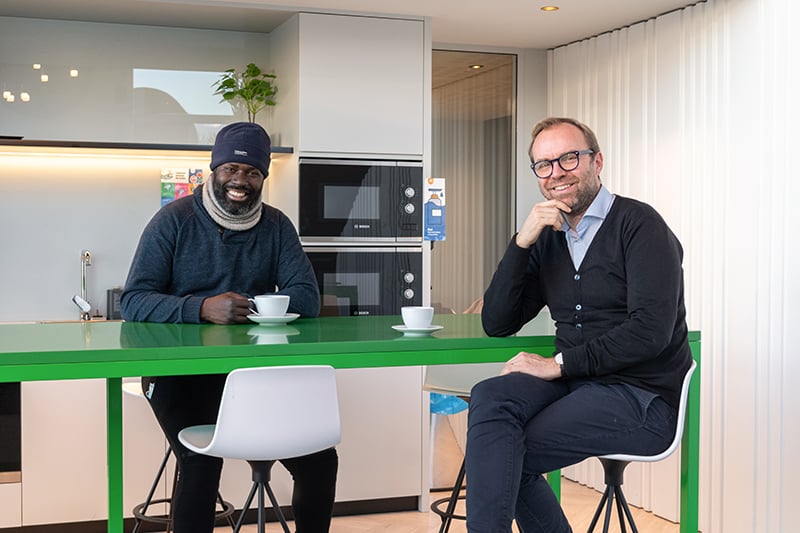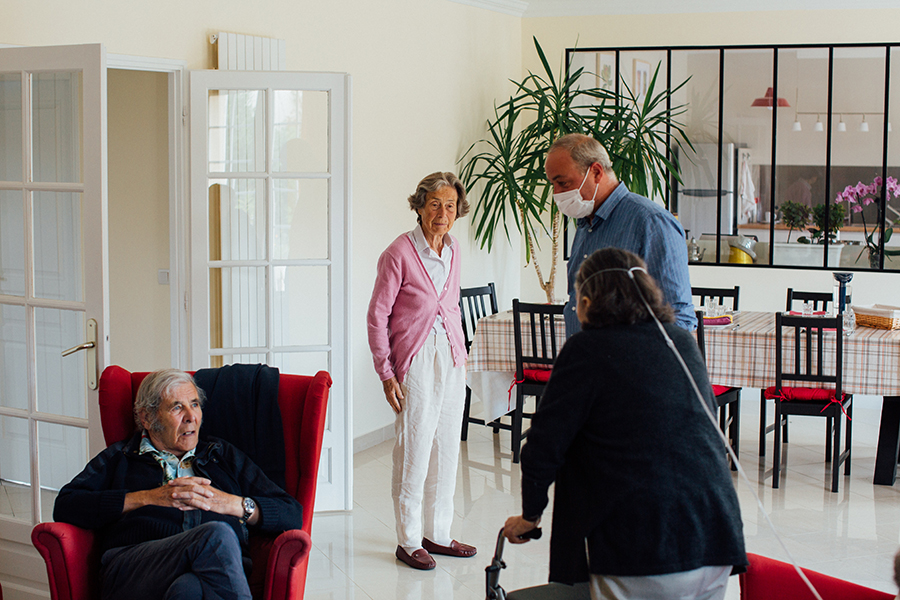Housing – living better together and saving the planet
Sub-standard housing, made worse by the pandemic, affects health, family relationships and social and professional integration, among other issues. Fondation de France and several donor-advised funds are actively tackling this key challenge. The throughline is that our response to poor housing must be transversal and multidisciplinary.
For the past 20 years, Fondation de France has been engaged in a dedicated housing program and the fight against sub-standard housing. Many donor-advised funds are mobilized on this topic and support work on the ground that is not limited to one-off shelter provision. Instead, it aims for a more global momentum of reconstruction and integration.
Housing, a first step towards social reintegration
For example, in Nantes, nonprofit Les Bureaux du cœur (Accommodation in Offices), supported by Fondation de France,* connects companies with organizations working with homeless people. Companies open up some of their offices for homeless people for the night and on weekends, for a renewable period of three months. In addition to accommodation, Les Bureaux du Cœur provides comprehensive support, facilitating access to care, informing people of their rights, pointing them to training programs, etc., with monthly reviews. The experience is a positive one for those who benefit from the scheme but also for employees. Pierre-Yves Loaëc, the nonprofit’s founder, explains: “This is a positive experience for companies and their staff. Ties are created over morning coffee and practical acts of kindness become more frequent. Which is why Les Bureaux du Cœur is now opening spaces for meetings and cooperation among people whose paths cross without seeing each other! At the end of its first year, the network was already established in 20 cities. Les Bureaux du Cœur continues to develop. The goal for 2024 is to offer this model in 100-150 cities, providing accommodation capacity for a total of 4,500 people.
There were around 300,000 homeless people
in France in 2021
Nonprofit Un Toit à Moi, supported by Actes 77 Foundation, Mustière-Rolland Foundation and Merymu Foundation, all Fondation de France donor-advised funds, is also involved in building bridges between shelter provision and social integration. The model consists in acquiring properties to offer them to homeless people. The properties are located in residential areas, in order to promote social diversity. Individual accommodation, together with personalized support, facilitates a return to employment. The key ingredient is a virtuous cycle in which social integration enables the person concerned to pay their rent and recover their dignity and confidence.
 From emergency accommodation to a more global momentum for integration - an approach that lies at the heart of Les Bureaux du Coeur’s work.
From emergency accommodation to a more global momentum for integration - an approach that lies at the heart of Les Bureaux du Coeur’s work.
Working with and not for people in sub-standard housing
These integration methods owe their effectiveness to participation from the people concerned. That is the philosophy of the Compagnons bâtisseurs (Journeymen Builders) who have been promoting supported self-rehabilitation for the past 60 years. The nonprofit trains volunteers and young people engaged in civic service to oversee residents renovating their homes themselves. A total of 3,700 renovation projects were supported in 2020.
Sub-standard housing does not only affect cities and suburbs, which is why les Compagnons Bâtisseurs purchased a number of “Bricobus” (buses for DIY) that travel around rural areas to provide assistance to owners and tenants where required. The nonprofit is supported by Fondation de France and the Castorama donor-advised fund, created in 2020. This recent foundation has made combating poor housing the cornerstone of its mission. It includes refurbishing housing with and for families facing hardship, for example, renovating a barge to accommodate homeless people and co-building housing units for vulnerable people (isolated young mothers, the parents of children in hospital, accident victims, low-income retirees, people with mental disorders and so on).
Working with people experiencing inadequate housing also means offering innovative accommodation solutions with a mix of generations and people with different profiles. In Thomery, east of Paris, the Maison des Cultures (a community center) has opened a shared residence for people with cognitive disorders. Over time, people who have low incomes but are independent will join them, as will disabled and elderly people. The project is supported by four Fondation de France programs (Housing, Elderly People, Disability and Mental Disorders). “By making it possible to live together and offer mutual assistance between the various beneficiaries and by encouraging everyone to contribute to living together, our aim is to break down isolation and stigma and promote social integration,” explains nonprofit cofounder Caroline Deligny. “The aim is also to be open to the village, as the Maison des Cultures will enable carers to stay in touch with their loved ones. The garden includes a ‘neighborhood kiosk’ for meetings with residents.”
In the same spirit, Fondation de France has chosen to encourage citizen hosting for refugees as part of the Migrant Solidarity and Housing programs. “Properly supported by nonprofits, this type of accommodation in private homes provides a solution in critical situations and also encourages social integration, meeting people and a change in perception of migrants” highlights Suzanne de Bellescize, in charge of the Migrant Solidarity Program.
 La Maison des sages (The Home of the Wise), shared by people affected by Alzheimer’s.
La Maison des sages (The Home of the Wise), shared by people affected by Alzheimer’s.
Towards accessible and sustainable housing
Collective engagement that involves residents, nonprofits and local authorities are critical in addressing both rural depopulation and the increase in land prices in certain areas. Such is the work of nonprofit Hameaux Légers (Low-Impact Hamlets), which has invented a new housing model. A “low-impact hamlet” includes a small number of ecological housing units, developed in partnership with the hosting town.
Land is rented by the resident collective, with a very long-term rental agreement (usually 99 years). Residents purchase the units, which are built on piles, and can be dismantled or moved if necessary. In addition, this reversible construction is designed with the aim of achieving zero waste and zero carbon. Disconnecting the ownership of the accommodation from that of the land makes it possible to offer very affordable housing. After a period of research and experimentation which confirmed the model’s feasibility, Hameaux Légers is ready to implement several pilot projects. “This is a highly innovative approach and has the potential to change things over the long term,” highlights Patrice Cieutat, in charge of the Fondation de France Housing Program. This is where philanthropy really comes into its own, by supporting the emergence of new solutions and joint projects and testing different inclusive and sustainable models.”
That’s because the issue of sustainability for our homes becomes increasingly crucial, year after year. In France, the housing sector represents 23% of all CO2 emissions. The poorest people live in places that are the least insulated and they have to spend 10% of their income on heating bills (whereas the national average stands at 7%). This creates energy poverty as well as health and social poverty. The government and local authorities do allocate grants, but remaining costs prevent low-income households from undertaking the necessary insulation.
Five million homes leak heat
To address these needs, Fondation de France and the JM Bruneau Foundation support the Soliha network – the leading non-profit movement in the industry for housing improvement – which brings together 145 organizations in France and offers the poorest people support for energy renovation. Rexel Pour l’Efficacité Energétique (Rexel for Energy Efficiency), a donor-advised fund, has also placed the fight against energy poverty at the heart of its work. Its projects include the “Voisin Malin” (Smart Neighbor) initiative in Roubaix, which trains and enlists the help of “worker-residents” to identify those households that face energy poverty. The latter are often unaware of the benefits they might be entitled to. “Smart neighbors” help them with their interactions with government agencies and companies.
The topic of housing also calls for a global rethink on cities and communities. Designing the city of the future requires cooperation from all stakeholders. In 2008, this key challenge led to the creation of the Palladio Foundation, which brings together 77 founders and donors relating to these topics**, from all industry sectors and professions. A place for interaction, training, exchanging ideas and experiences, the Palladio Foundation has created the “University for the Cities of the Future” and facilitates multidisciplinary work groups on low-carbon cities. In the run-up to the presidential election, the foundation completed a major public consultation based on proposals for more sustainable cities. Some 40,000 participants voted on the most popular themes. Mobility came first, followed by topics relating to building and renovation – especially energy renovation and materials recycling in new builds. The third theme was nature and biodiversity, with proposals for greening cities.
*The Bureaux du Cœur project is supported by Fondation de France Inventing the Future Program.
** The Palladio Foundation brings together actors from the entire industry: planning, architecture, insurance, banking, building, energy, environment, real estate, engineering, logistics, digitization, transport, urban development, local authorities, non-profit sector, researchers and media.

